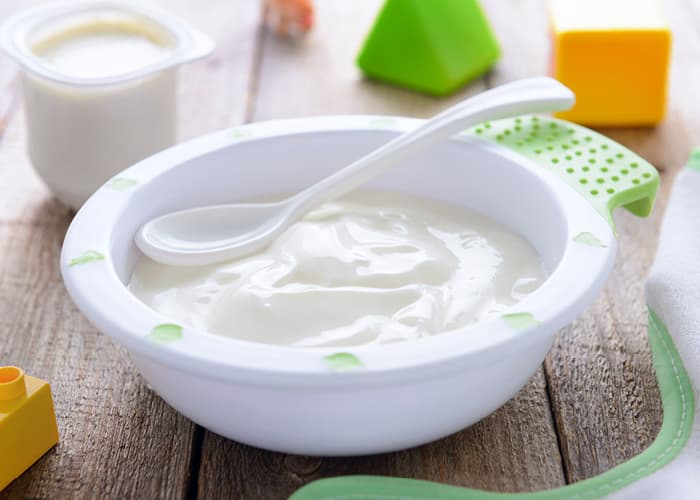
Yogurt for the baby: what should we pay attention to?
As parents, it's natural to want the best for our baby, so we want to offer them only high-quality, healthy foods from verified sources. But what is considered healthy when it comes to dairy products, which offer a wide variety of types?
Which yogurt is ideal for the baby?! Sugary or sugar-free? Made from whole milk, low-fat, or lactose-free? Traditional cow's milk or plant-based yogurt? Plain or flavored? Branded or private label? There are countless questions we need to find answers to.
When can yogurt be included in the baby's diet?
According to our current knowledge, it is advisable to wait until the first birthday to introduce drinkable milk, but yogurt can be given much earlier, around the 6-8 month mark. The introduction of yogurt, like any new food, should be gradual. Initially, one or two teaspoons of yogurt can be added to already familiar fruit or vegetable purees, or stews. Gradually increasing the amount, over time, yogurt can even replace a small meal.
Would you like to learn more about the role of dairy products in complementary feeding? Listen to the ManóMenü podcast episode titled What should you know about milk?

The Benefits of Consuming Yogurt
Yogurt is not only delicious but also beneficial, as the probiotics found in it contribute to the balance of our digestive and intestinal flora. Let's not forget! We are talking about one of, if not the most important cornerstone of our immune system.
Yogurt contains calcium - make sure to intake vitamin D for absorption! - as well as vitamins B6 and B12, potassium, riboflavin, and magnesium. Moreover, the probiotics and fat found in yogurt help absorb certain vitamins and minerals, support digestion, and contribute to regular bowel movements.
Types of Yogurt: What Should You Know About Them?
We encounter many different types of yogurt, but do we know the differences between them? Below, I will introduce you to the most common ones so you know what makes each special.
-
Natural Yogurt: usually made from 5% milk, inoculated with yogurt culture, and then curdled.
-
Greek Yogurt: offers a creamier, softer taste experience, due to the process removing significantly more whey than in regular yogurts.
-
Fruit Yogurt: made from natural yogurt with the addition of fruits, fruit extracts, sugar, and other additives.
-
Plant-Based Yogurt: made from coconut milk, almond milk, or soy milk in a manner similar to traditional yogurt. Almond and soy-based versions are recommended to be consumed in limited quantities after the age of one, due to the presence of phytoestrogens in soy yogurt. The coconut milk version is an excellent choice for children with milk allergies, provided the child does not show a cross-allergic reaction to coconut.
-
Skyr, or Icelandic Yogurt, is made using three to four times as much milk as traditional yogurts, resulting in exceptionally high protein content.
-
Fat-Free: made from 0% or skimmed milk, although it may have a higher sugar content than its fatty counterparts to achieve optimal taste.
-
Low-Fat: made using 2% milk, resulting in a product with low fat content.

What is the ideal yogurt for babies?
It's not always the best that seems so at first glance! If your baby has no known allergies or digestive disorders, choose plain or Greek yogurt made from whole milk with a fat content of 3-5%.
It's important to know that Greek yogurt has a slightly firmer texture, making it easier to serve, but due to its higher protein content, it's worth monitoring the amount consumed by the little one. Protein is important, but too much protein can also cause problems!
You also need to pay attention to sugars and sweeteners, as well as various flavorings. Babies, especially from six to twelve months old, are real explorers who are eager and open to discovering the world of flavors. It's best to introduce them not only to sweet but also to salty, sour, or even bitter tastes.
Homemade yogurt and special yogurt flavorings
If you enjoy experimenting in the kitchen, you can even make various yogurts at home. However, it is very important to obtain milk from a reliable, controlled source and always subject the ingredients to proper heat treatment!
If the little one does not accept plain yogurt despite persistent attempts, don't give up, but try special yogurt flavorings! A small spoonful of peanut butter, a spoonful of plain - sugar and sweetener-free - jam, or fruit puree, or even a little cottage cheese can work wonders with even the simplest yogurt!

